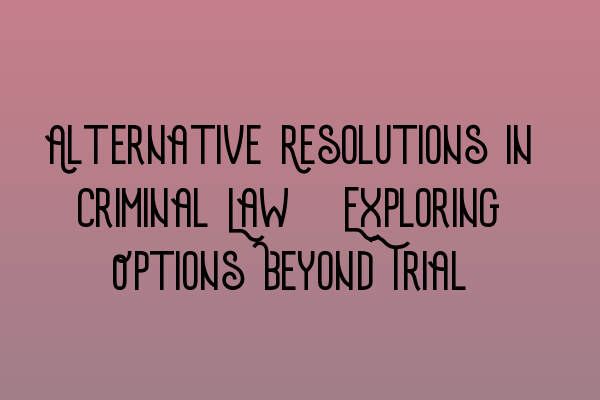Alternative Resolutions in Criminal Law: Exploring Options Beyond Trial
As criminal defense solicitors, our goal is always to obtain the best possible outcome for our clients. While trials are a traditional and often effective way to achieve this, it is important to explore alternative resolutions that might be more favorable or suitable in certain cases. In this article, we will discuss different options beyond trial that can be pursued in criminal law.
1. Diversion Programs
Diversion programs are an excellent alternative resolution for individuals charged with minor offenses, especially if they have no prior criminal record. These programs aim to divert defendants away from the traditional criminal justice system and provide them with an opportunity to address the underlying issues that led to their involvement in the criminal activity.
By participating in diversion programs, defendants can avoid the formal prosecution process and, upon successful completion, have their charges dropped or reduced. Diversion programs offer various rehabilitation options, such as counseling, community service, or educational programs, tailored to address the specific needs of the individuals.
If you are interested in learning more about diversion programs, you can check out our related article on SQE 1 Practice Mocks FLK1 FLK2. It provides in-depth information about how these programs work and their potential benefits.
2. Restorative Justice
Restorative justice is an alternative resolution that focuses on repairing the harm caused by the offense. It involves bringing together the victim, offender, and the community affected by the crime to facilitate dialogue and reach a mutually agreed resolution.
This approach aims to provide victims with a sense of closure and satisfaction while holding the offender accountable for their actions. Restorative justice encourages empathy, understanding, and the opportunity for the offender to take responsibility and make amends.
If you want to explore the concept of restorative justice further, you can refer to our related article on SQE 2 Preparation Courses. It delves into the principles and processes of restorative justice, offering valuable insights into its effectiveness in criminal law.
3. Plea Bargaining
Plea bargaining is a common practice in criminal law that allows defendants to negotiate with the prosecution for a lesser charge or a reduced sentence in exchange for a guilty plea. This resolution method can save time, cost, and resources associated with a trial, and it often leads to a swifter resolution for both parties involved.
It is important to note that plea bargaining requires careful consideration as it involves striking a balance between the defendant’s interests and the strength of the prosecution’s case. An experienced criminal defense solicitor can guide you through this process and help you make an informed decision.
If you are preparing for the SQE 1 exam and seeking more practice questions, you may find our related article on SQE 1 Practice Exam Questions helpful. It provides a comprehensive bank of practice questions related to criminal law and other areas tested in the SQE 1 examination.
4. Deferred Prosecution Agreements
Deferred Prosecution Agreements (DPAs) are formal arrangements between the prosecution and a corporate entity accused of criminal offenses. DPAs allow companies to avoid a trial by agreeing to certain conditions, such as paying fines, implementing compliance programs, or accepting independent monitoring.
This resolution option is especially beneficial for companies that want to resolve criminal allegations while minimizing potential damage to their reputation and operations. DPAs can provide an opportunity for companies to demonstrate their commitment to rectifying any wrongdoing and preventing further offenses.
If you are seeking more information on SQE exams and their scheduled dates, our related article on SRA SQE Exam Dates can be incredibly useful. It outlines the upcoming examination dates and registration deadlines for both SQE 1 and SQE 2 exams.
Conclusion
While trials are an integral part of the criminal justice system, it is essential to explore alternative resolutions that can offer favorable outcomes for defendants and the wider community. Diversion programs, restorative justice, plea bargaining, and deferred prosecution agreements are just a few examples of alternative paths that can be pursued.
As criminal defense solicitors at SQE Criminal Law & Practice Law UK, we understand the importance of considering all available options and tailoring our strategies to best meet our clients’ needs. If you require legal assistance or have any questions regarding alternative resolutions in criminal law, please do not hesitate to contact us.
